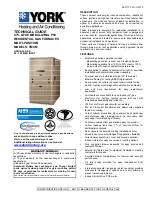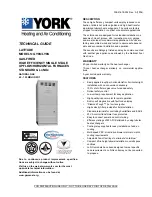
59SU5A: Installation, Start-up, Operating and Service Maintenance Instructions
Manufacturer reserves the right to change, at any time, specifications and designs without notice and without obligations.
4
Improper installation, adjustment, alteration, service, maintenance, or
use can cause explosion, fire, electrical shock, or other conditions which
may cause death, personal injury, or property damage. Consult a
qualified installer, service agency, or your distributor or branch for
information or assistance. The qualified installer or agency must use
factory-authorized kits or accessories when modifying this product.
Refer to the individual instructions packaged with the kits or accessories
when installing.
Installing and servicing heating equipment can be hazardous due to gas
and electrical components. Only trained and qualified personnel should
install, repair, or service heating equipment. Untrained personnel can
perform basic maintenance functions such as cleaning and replacing air
filters. All other operations must be performed by trained service
personnel. When working on heating equipment, observe precautions in
literature, on tags, and on labels attached to or shipped with furnace and
other safety precautions that may apply.
These instructions cover minimum requirements and conform to existing
national standards and safety codes. In some instances, these instructions
exceed certain local codes and ordinances, especially those that may not
have kept up with changing residential construction practices. We
require these instructions as a minimum for a safe installation.
Follow all safety codes. Wear safety glasses, protective clothing, and
work gloves. Have a fire extinguisher available. Read these instructions
thoroughly and follow all warnings or cautions included in literature and
attached to the unit.
This is the safety-alert symbol
. When you see this symbol on the
furnace and in instructions or manuals, be alert to the potential for
personal injury.
Understand the signal words DANGER, WARNING, and CAUTION.
These words are used with the safety-alert symbol. DANGER identifies
the most serious hazards which will result in severe personal injury or
death. WARNING signifies a hazard which could result in personal
injury or death. CAUTION is used to identify hazards which may result
in minor personal injury or product and property damage. NOTE and
NOTICE are used to highlight suggestions which will result in enhanced
installation, reliability, or operation.
1. Use only with type of gas approved for this furnace. Refer to the
furnace rating plate.
2. Install this furnace only in a location and position as specified in the
“Location” section of these instructions.
3. Provide adequate combustion and ventilation air to the furnace
space as specified in “Air for Combustion and Ventilation” section.
4. Combustion products must be discharged outdoors. Connect this
furnace to an approved vent system only, as specified in the
“Venting” section of these instructions.
5. Never test for gas leaks with an open flame. Use a commercially
available soap solution made specifically for the detection of leaks
to check all connections, as specified in the “Gas Piping” section.
6. Always install furnace to operate within the furnace’s intended
temperature-rise range with a duct system which has an external
static pressure within the allowable range, as specified in the
“Start-Up, Adjustments, and Safety Check” section. See furnace
rating plate.
7. When a furnace is installed so that supply ducts carry air circulated
by the furnace to areas outside the space containing the furnace, the
return air shall also be handled by duct(s) sealed to the furnace
casing and terminating outside the space containing the furnace.
See “Air Ducts” section.
8. A gas-fired furnace for installation in a residential garage must be
installed as specified in the warning box in the “Location” section.
9. The furnace is not permitted to be used for heating of buildings
under construction.
10. These Upflow/Horizontal Gas-Fired Furnaces are CSA
design-certified for use with natural gas (see furnace rating plate)
and for installation in alcoves, attics, basements, closets, utility
rooms, crawlspaces, and garages. The furnace is factory-shipped
for use with natural gas and cannot be converted to propane gas.
11. For required clearances to combustible construction (
).
Ensure sufficient clearance for furnace condensate trap installation.
See Location and Condensate Trap sections for required and
recommended clearances (see
).
NOTE:
Furnace edge contact is permissible with combustible materials
unless local codes state otherwise.
12. Maintain a 1-in. (25 mm) clearance from combustible materials to
supply air ductwork for a distance of 36 in. (914 mm) horizontally
from the furnace. See NFPA 90B or local code for further
requirements.
13. These furnaces SHALL NOT be installed directly on carpeting,
combustible tile, or any other combustible material other than wood
flooring. Clearance to combustible construction information
(
).
CAUTION
!
FURNACE RELIABILITY HAZARD
Failure to follow this caution may result in unit component damage.
Application of this furnace should be indoors with special attention
given to vent sizing and material, gas input rate, air temperature rise,
unit leveling, and unit sizing.
CAUTION
!
CUT HAZARD
Failure to follow this caution may result in personal injury.
Sheet metal parts may have sharp edges or burrs. Use care and wear
appropriate protective clothing, safety glasses and gloves when
handling parts, and servicing furnaces.
Table 1 – Minimum Clearances to Combustible Materials for All
Units
POSITION
CLEARANCE
REAR
1 in.
FRONT
(Combustion air openings in furnace
and in structure)
1 in.
Required for service
24 in.
*
*. Consult local building codes.
All Sides of Supply Plenum
1 in.
Sides
1 in.
†
†. Additional clearance is required for condensate trap installation.
Vent
0
Top of Furnace
1 in.





































